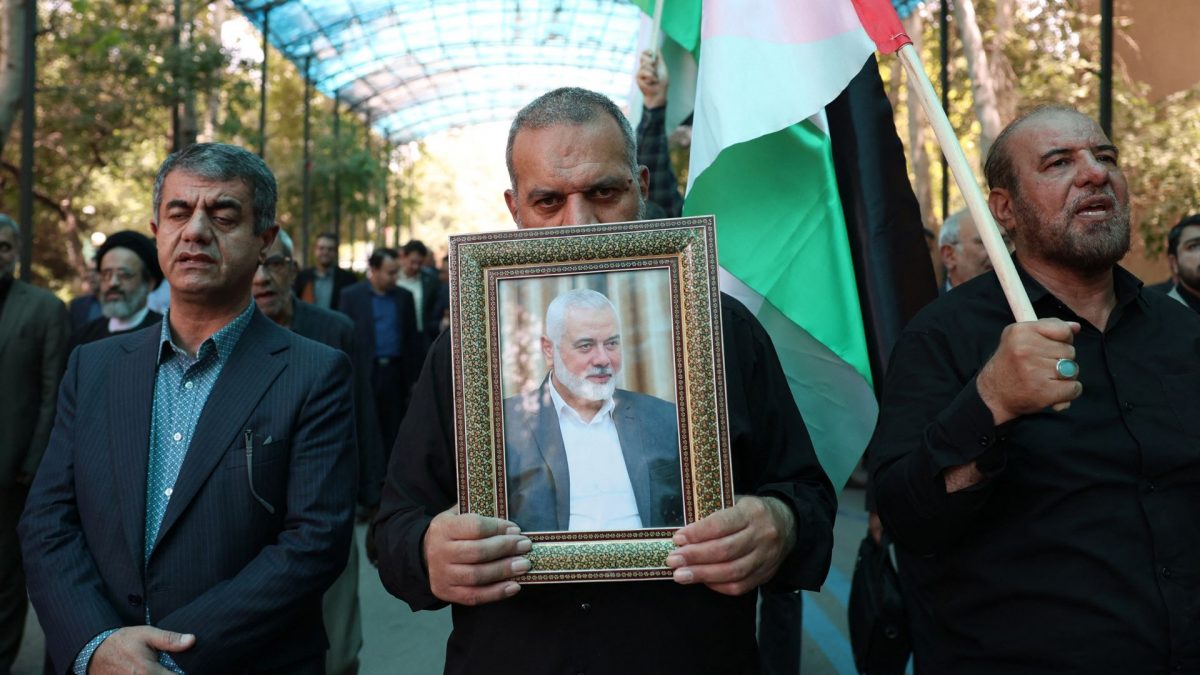Iran has vowed to avenge the assassination of Hamas chief Ismail Haniyeh in Tehran, which it blamed on Israel read more
)
People hold up the Palestinian flag and a portrait of assassinated Hamas chief Ismail Haniyeh Hamas, during a rally at Tehran University, in the Iranian capital Tehran on July 31, 2024. Source: AFP.
Iran has told Arab countries that it no longer cares whether its attack on Israel will trigger an all-out war in the Middle East, according to a report.
Following the assassination of Hamas chief Ismail Haniyeh in Tehran, which Iran has blamed on Israel, an Iranian attack on Israel is considered imminent as the regime has vowed to avenge the killing.
There are fears that Iran’s attack and the subsequent Israeli retaliation could envelop the entire Middle East in an all-out war. Since the beginning of the war in the Middle East last year with Hamas’ attack on Israel, the two countries had made conscious to not get involved in a full-scale war. But, now, it appears that the understanding has broken as there is no assurance a war will be averted.
Now, Iran has told Arab countries that it does not care if an attack on Iran leads to an all-out war, according to The Wall Street Journal.
Even though it has been reported that the Israeli attack will be like the attack in April, there are clear differences this time. The first and foremost being that Iran has a much sharper attitude this time.
Iran has refused to share plans: Report
Unlike April, Iran has refused to give indications about the attack on Israel, according to The Wall Street Journal.
In April, after Israel assassinated top Iranian commanders in an airstrike on a diplomatic building in Syrian capital Damascus, Iran launched the first-ever direct attack on Israel. It fired more than 600 missiles, drones, and rockets at Israel.
Even though Iran launched a massive barrage on Israel, it had telegraphed its intention through backchannels and public messaging in order to give enough time to Israel and its allies to prepare to fend off the attack and make way for further de-escalation. To beat the Iranian barrage, the United States forged a coalition with the United Kingdom, France, Israel, Jordan, and Saudi Arabia.
The United States is looking forward to revive the coalition this time too but it would be much harder as anti-Israel sentiment has increased substantially in the region following Haniyeh’s killing.
In a bid to contain the fallout from the Iranian attack considered imminent, the United States had asked European and other partners to convey to Iran to not escalate and warn Iran that any attack would be met with a response, according to The WSJ.
The newspaper reported that despite the efforts, Iran has refused to share detailed warnings this time the way it did in April.
In last-ditch efforts to contain the fallout, Jordan Foreign Minister Ayman Safadi is in Tehran at the moment to hold talks with the Iranian regime.
Axios has reported that Israel and the United States have assessed that the Iranian attack could come as early as Monday.
Separately, Ynet reported that Israel has assessed that Iran may be joined in the attack by groups it backs in the region, such as the Lebanon-based Hezbollah. It further said that the assessment says that the Iranian attack may open a war on as many as five fronts.

 1 month ago
10
1 month ago
10
)
)
)
)
)
)
)
)
)
)
)
)
)
)
)
)
)
)
)
)
)
)
)
)
)
 English (US) ·
English (US) ·